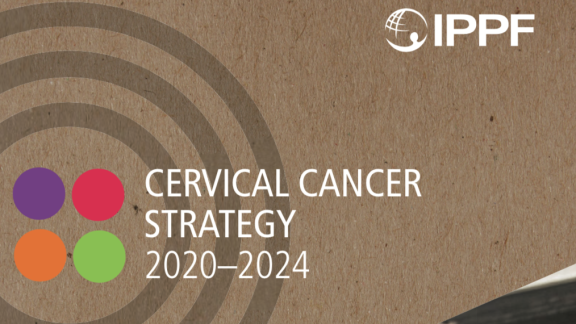ABOUT THE PUBLICATION
This strategy has been developed to strengthen and expand IPPF Comprehensive Cervical Cancer Prevention (CCCP) work. The IPPF Cervical Cancer Strategy 2020–2024 is underpinned by the principles of inclusiveness, human rights, gender equality, and health equity.
This Strategy is prepared with a purpose to clarify IPPF’s pathway to strengthen CCCP in the Federation’s work and ensure women, girls and other affected populations can have access to age-appropriate CCCP information and services.
WHY THE STARTEGY?
Cervical cancer is the fourth most common cancer among women in the world. All countries are affected, particularly low- and middle- income countries (LMICs). In 2018, 85 per cent of the 311,000 deaths from cervical cancer occurred in less developed regions. The higher rates of cervical cancer incidence and mortality in LMICs reflect the limited equitable access to high-quality information, vaccination, screening and treatment, and cancer management in these countries.
Human papillomavirus (HPV) is the primary cause of cervical cancer. HPV is mainly transmitted through unprotected sexual contact, including skin-to-skin genital contact. Most HPV infections are self-limiting and can be cleared up by the immune system. However, if the infection persists, it may lead to precancerous cervical lesions or even cervical cancer. For people with weakened immune systems, such as those with poorly controlled human immunodeficiency virus (HIV) infection, the risks are far greater.
A Comprehensive Cervical Cancer Prevention (CCCP) initiative should include primary, secondary, and tertiary prevention, which is in line with the client-centred and life-course approach.
IPPF’S WORK TOWARDS CERVICAL CANCER ELIMINATION
To reduce HPV transmission and contribute to the elimination of cervical cancer, IPPF provides CCCP to save lives, strengthen health equity, address stigma and harmful social/gender norms that create barriers to access of timely and high-quality services, and fulfil the sexual and reproductive health and rights (SRHR) of all people.
Addressing cervical cancer and sexually transmitted infections (STIs) transmission is a core part of IPPF’s mandate and is included within the Integrated Package of Essential Services (IPES).
IPPF acknowledges that cervical cancer can affect any individual with a cervix – including women, girls, transgender men, non-binary and intersex people – referred to as affected populations in this Strategy.
when








